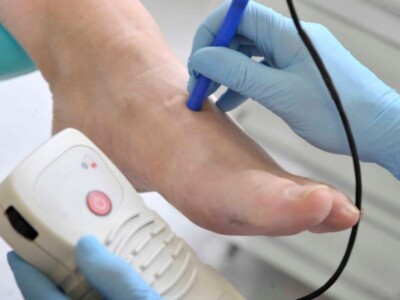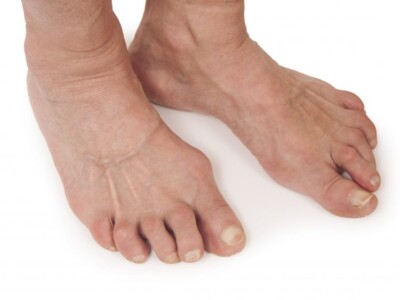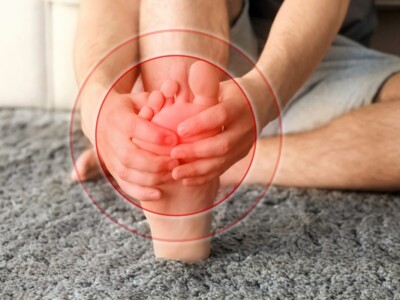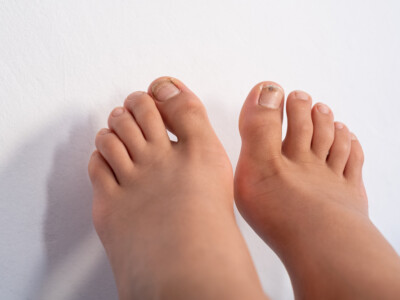Footcare for people with Diabetes
Diabetes may affect your feet in a number of ways and in some cases can lead to serious complications. One of the early changes can be loss of sensation in your feet, often starting at the toes. This is known as peripheral neuropathy. This may be gradual and at first can go unnoticed, which is why it is important that you receive an annual diabetic footcare assessment from a podiatrist.
What does your podiatrist look for?
If you are presently at low risk of an ulcer you can expect your podiatrist to check your feet once a year. However, if you are at increased risk of complications, these inspections may be done more frequently. The podiatrist will normally check both the pulses in your feet and look for evidence of loss of sensation in your feet. They will also be looking for any foot deformity or signs of excessive pressure that may warrant either footwear advice, removal of hard skin and in some cases an insole.
Consult your podiatrist immediately if you see any of the following in your feet:
-
- A break in the skin
- Discharge coming from the foot
- Colour changes over part or all of the foot.
- New swelling in your feet
You should also seek an urgent appointment with your podiatrist or GP if you normally have little or no feeling in your feet but suddenly experience unexplained pain or discomfort, especially if the surrounding skin is a little warmer to the touch compared with the same spot on the other foot.
Can I prevent or slow down any changes to my feet?
It is possible to prevent or delay changes affecting your feet if you follow medical advice and keep blood sugar, cholesterol and blood pressure levels within the target range set by your doctor. Your chances of doing this will be greatly increased if you do not smoke
Always check your feet every day
It’s a good habit to get into and extremely important if you have lost sensation in your feet. Look for any colour changes or damage to the skin. If you see anything unusual or have a cut, scratch or blister, contact your podiatrist especially if it is not healing. The podiatrist would rather be consulted for a relatively trivial complaint early than for a more serious problem later.
Clean and dress any cuts, scratches or wounds
Remember diabetes may affect your ability to heal and reduce your natural ability to fight bacteria. Consequently, you should run water over the wound, dry the skin around the wound (but not the wound itself) and apply a sterile dressing before consulting your podiatrist or GP’s surgery.
Always wear footwear
If you have lost feeling in your feet, then it is possible that you may unknowingly damage them. You may stand on a sharp object like a nail, piercing the skin without realising.
Always wear shoes that fit properly
You should always wear shoes that do not mark the skin or cause you calluses, for example on the tops or side of the toes. When buying new shoes, get your feet measured. If suddenly you feel you need a smaller size shoe because your old size starts to feel loose, see your podiatrist as this may be an early sign of loss of feeling in your feet.
Never sit with your feet to close to a fire
Also always remove the hot water bottle or switch off the electric blanket before getting into bed. It is possible if you have lost feeling to burn your feet and develop a foot ulcer as a consequence. Simple day-to-day advice if you have corns and calluses.
Visit a podiatrist regularly
Your podiatrist will remove any corns and calluses. Corns and calluses are signs of pressure on the skin and can lead to ulceration if untreated. Often, but not always, this will become evident by bruising underneath the skin. If you see such bruising make an urgent appointment to see your podiatrist.
Do not be tempted to use corn plasters
They can, if you have lost some feeling or have poor circulation, cause unnecessary damage that could have serious consequences.
Nail cutting
If you are able to, cut your nails straight across and use an emery board. If you have difficulties or are troubled with an in-growing toenail consult a podiatrist.
If you have diabetes it is important that you have your feet checked at least once a year, so that you receive the appropriate level of care. The podiatrist is in a position to give you appropriate advice and treatment; they can treat any corns, callous, ulcers or pressure sores which you may have developed.
Remember your foot is checked to assess the risk of developing complications, and this is important.
Why go for regular check-ups?
If you have diabetes it is important that you have your feet checked at least once a year, so that you receive the appropriate level of care. The podiatrist is in a position to give you appropriate advice and treatment; they can treat any corns, callous, ulcers or pressure sores which you may have developed.
Remember your foot is checked to assess the risk of developing complications, and this is important.
Book a Podiatry Appointment
Other Conditions We Treat
What our clients say









